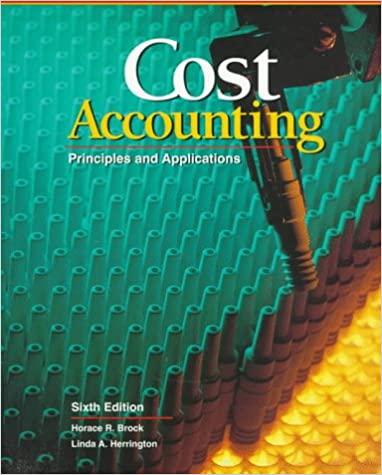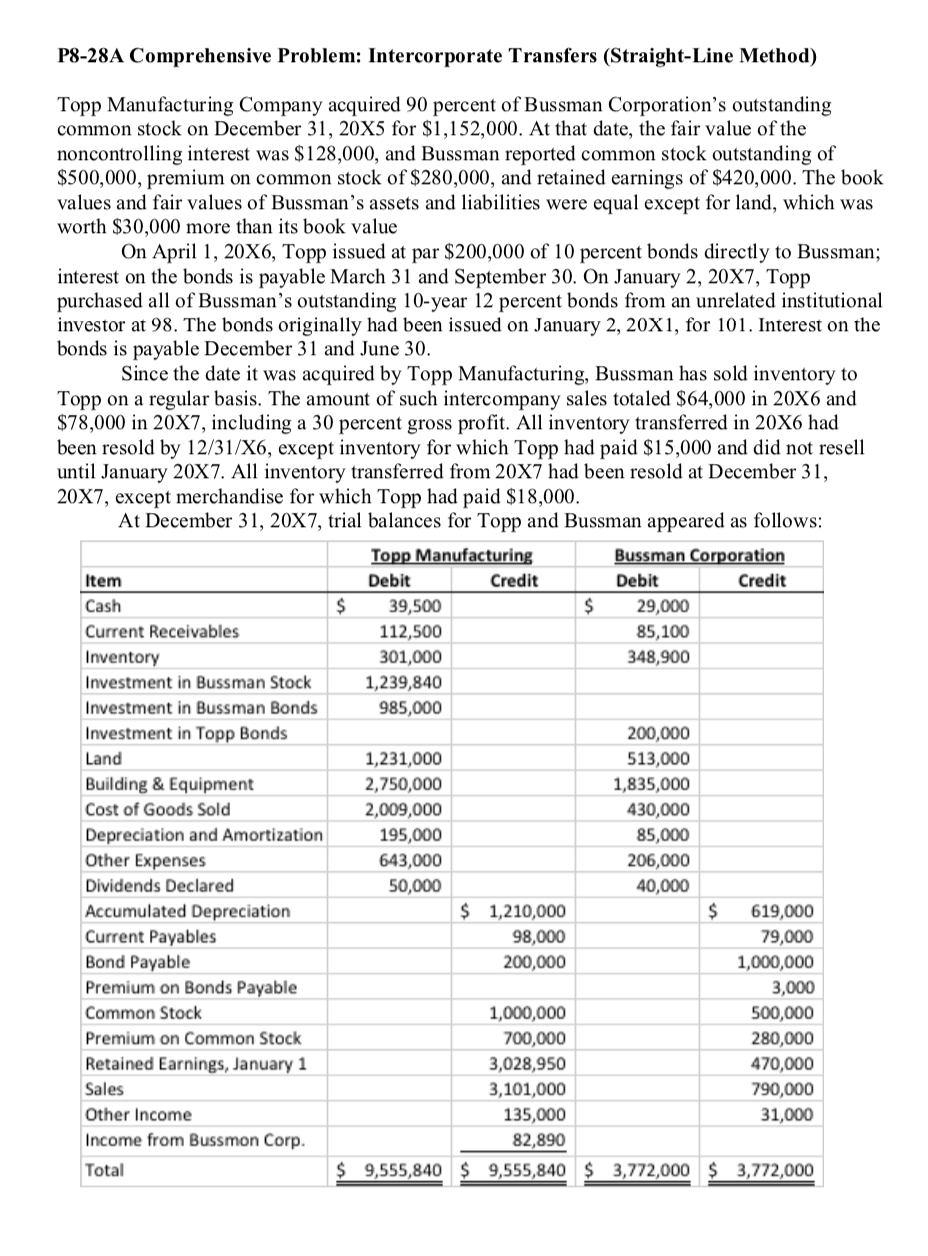
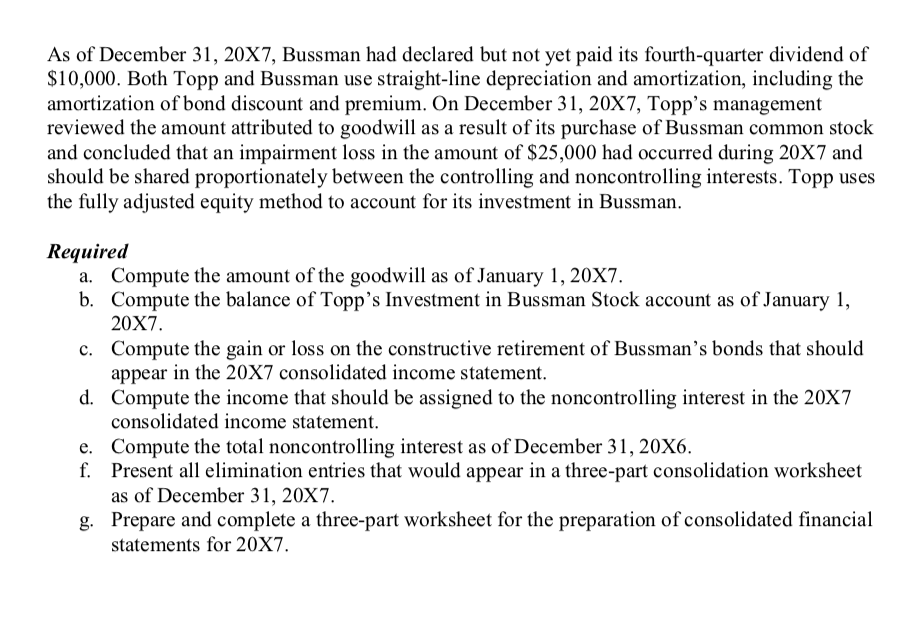
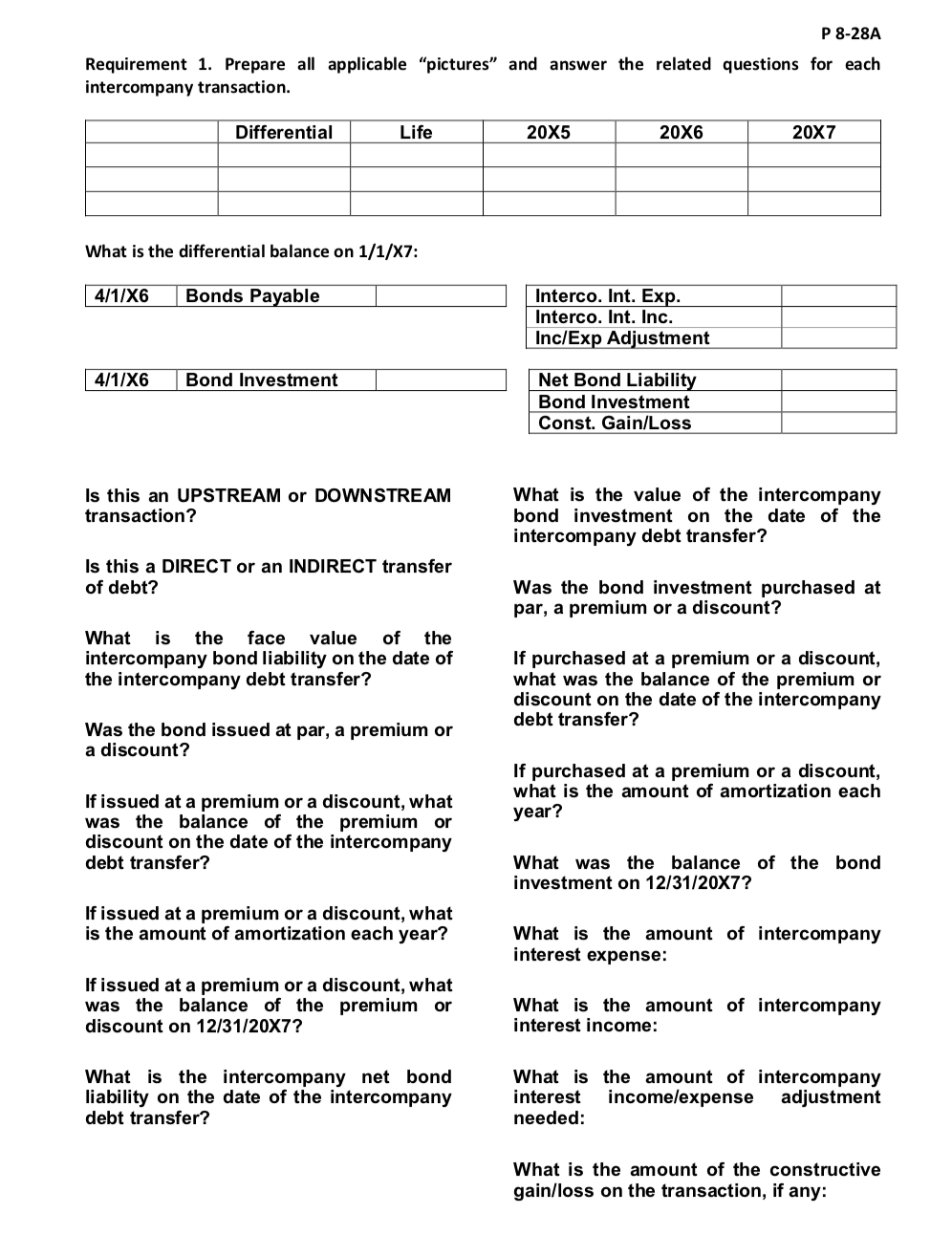
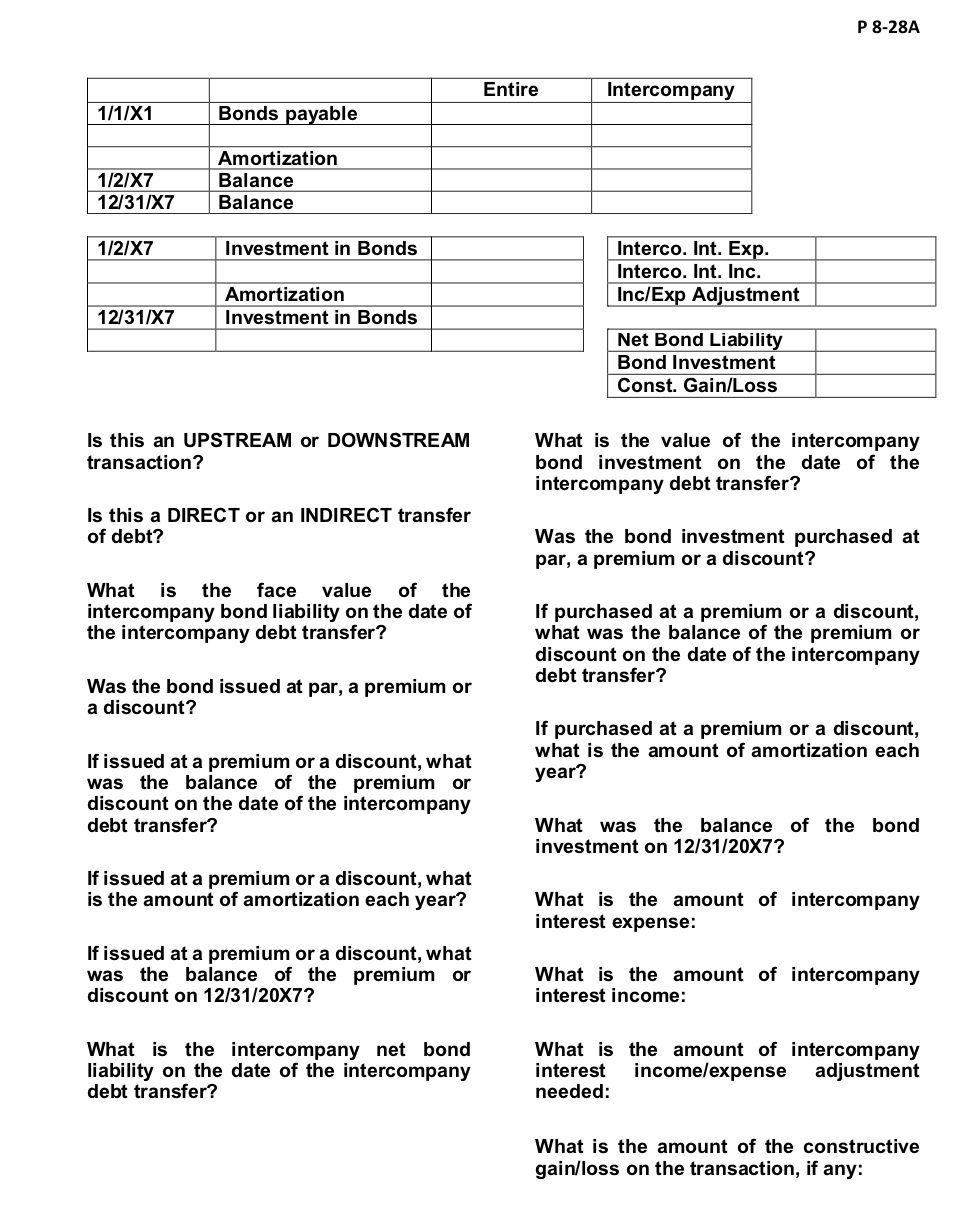
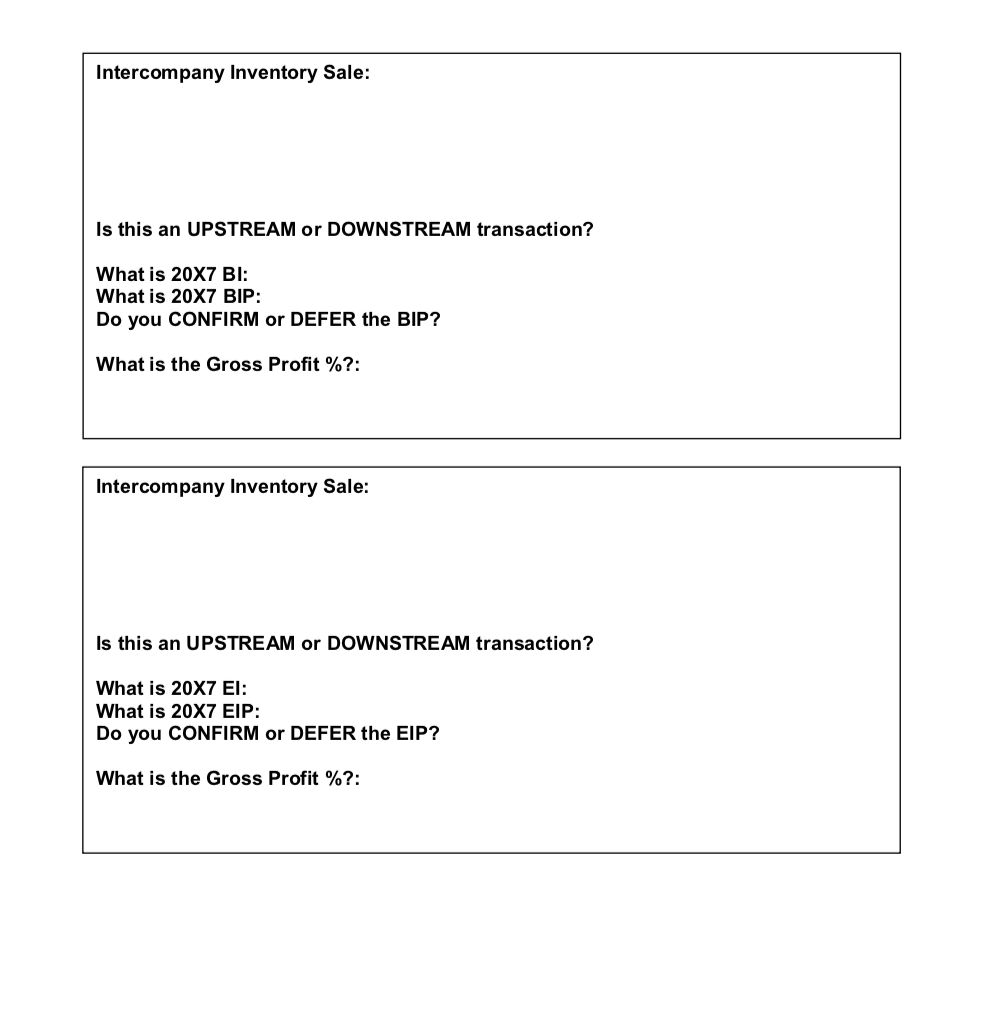
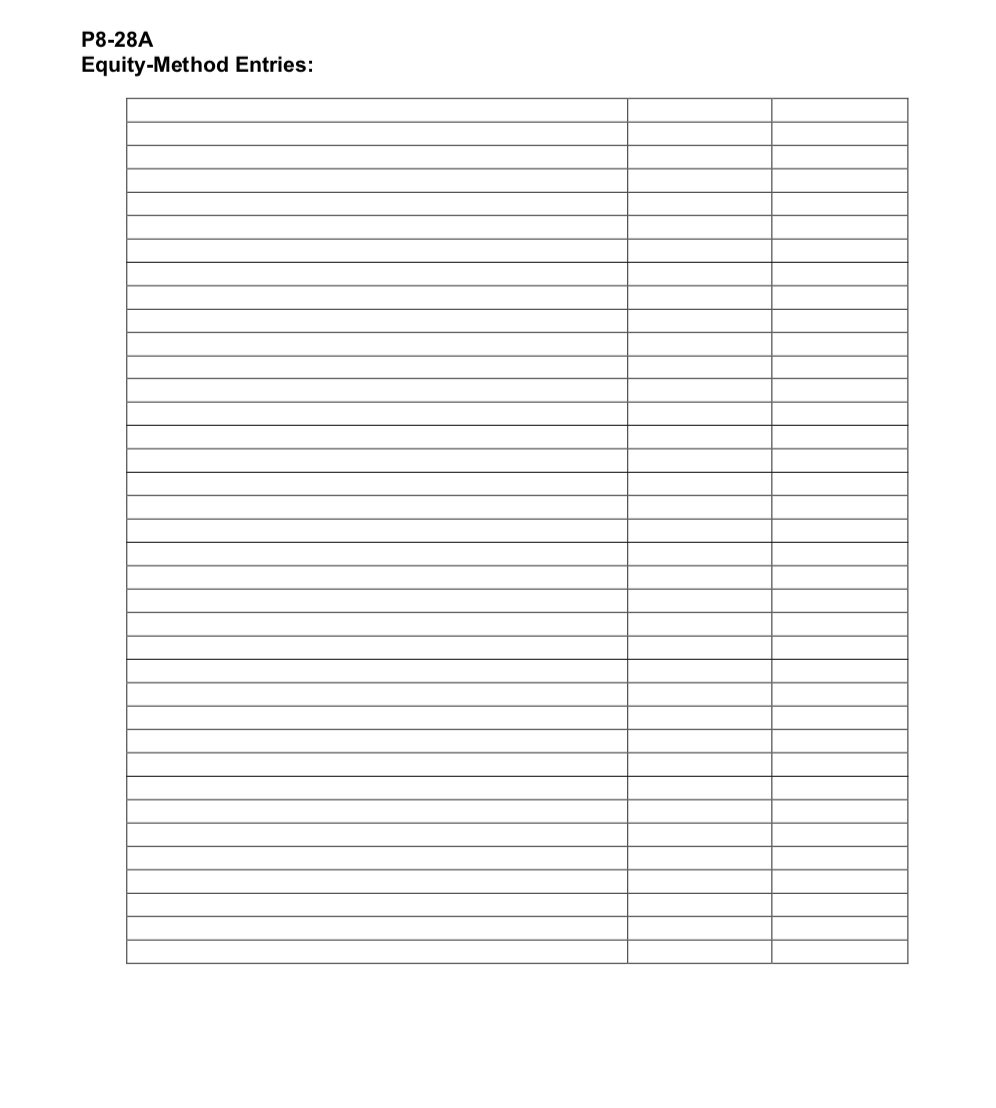
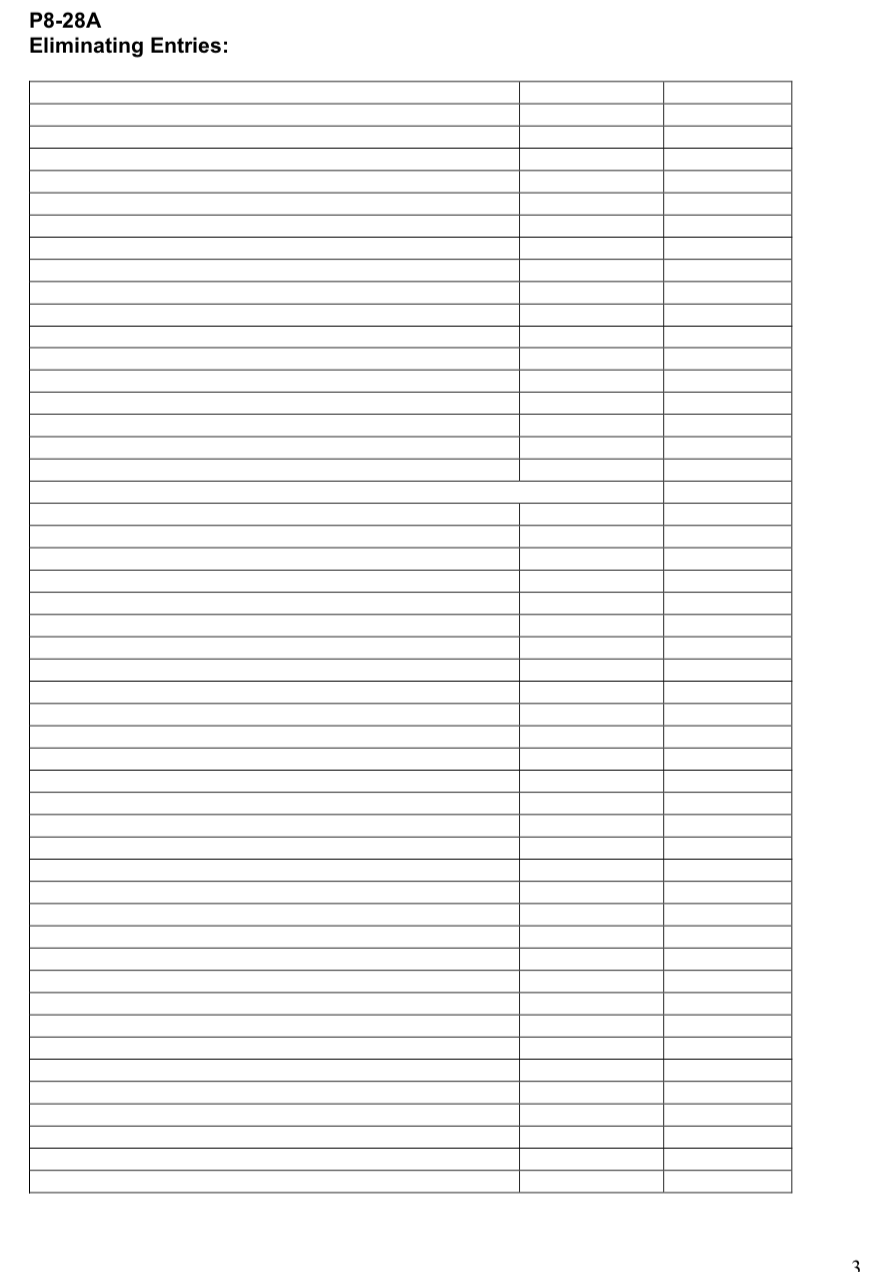
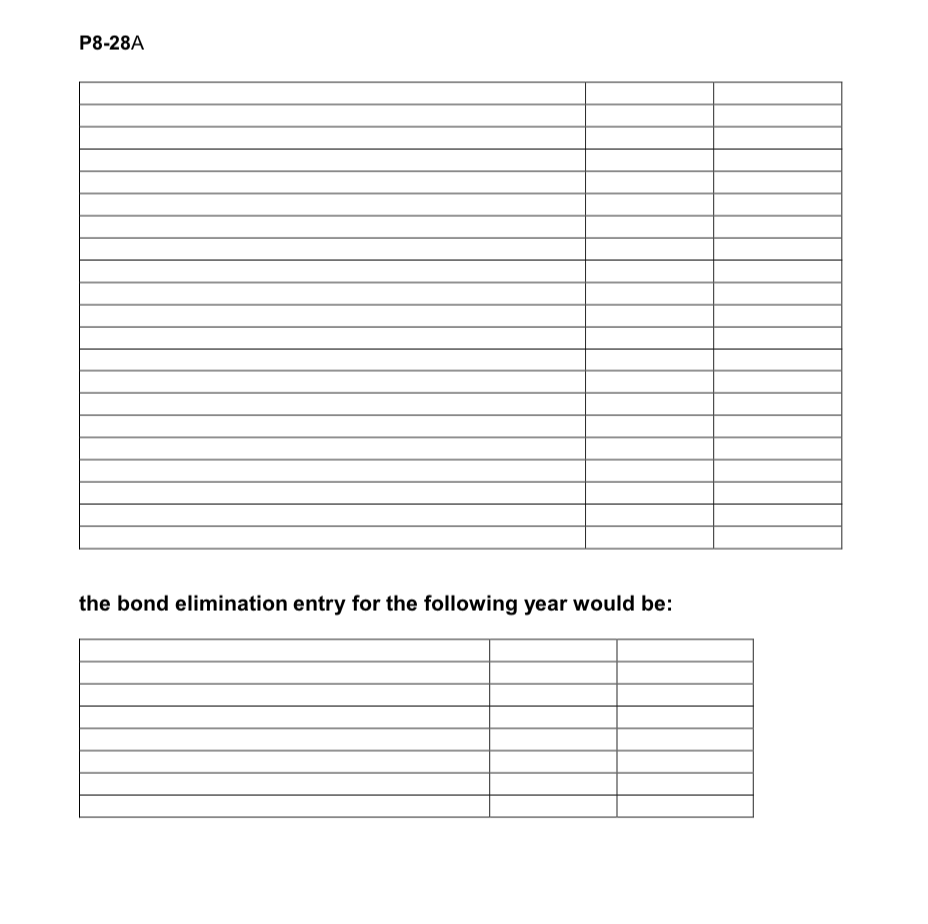
P8-28A Comprehensive Problem: Intercorporate Transfers (Straight-Line Method) Topp Manufacturing Company acquired 90 percent of Bussman Corporation's outstanding common stock on December 31, 20X5 for $1,152,000. At that date, the fair value of the noncontrolling interest was $ 128,000, and Bussman reported common stock outstanding of $500,000, premium on common stock of $280,000, and retained earnings of $420,000. The book values and fair values of Bussman's assets and liabilities were equal except for land, which was worth $30,000 more than its book value On April 1, 20X6, Topp issued at par $200,000 of 10 percent bonds directly to Bussman; interest on the bonds is payable March 31 and September 30. On January 2, 20X7, Topp purchased all of Bussman's outstanding 10-year 12 percent bonds from an unrelated institutional investor at 98. The bonds originally had been issued on January 2, 20X1, for 101. Interest on the bonds is payable December 31 and June 30. Since the date it was acquired by Topp Manufacturing, Bussman has sold inventory to Topp on a regular basis. The amount of such intercompany sales totaled $64,000 in 20X6 and $78,000 in 20X7, including a 30 percent gross profit. All inventory transferred in 20X6 had been resold by 12/31/X6, except inventory for which Topp had paid $15,000 and did not resell until January 20X7. All inventory transferred from 20x7 had been resold at December 31, 20X7, except merchandise for which Topp had paid $18,000. At December 31, 20X7, trial balances for Topp and Bussman appeared as follows: Topp Manufacturing Bussman Corporation Item Debit Credit Debit Credit Cash $ 39,500 $ 29,000 Current Receivables 112,500 85,100 Inventory 301,000 348,900 Investment in Bussman Stock 1,239,840 Investment in Bussman Bonds 985,000 Investment in Topp Bonds 200,000 Land 1,231,000 513,000 Building & Equipment 2,750,000 1,835,000 Cost of Goods Sold 2,009,000 430,000 Depreciation and Amortization 195,000 85,000 Other Expenses 643,000 206,000 Dividends Declared 50,000 40,000 Accumulated Depreciation $ 1,210,000 $ 619,000 Current Payables 98,000 79,000 Bond Payable 200,000 1,000,000 Premium on Bonds Payable 3,000 Common Stock 1,000,000 500,000 Premium on Common Stock 700,000 280,000 Retained Earnings, January 1 3,028,950 470,000 Sales 3,101,000 790,000 Other Income 135,000 31,000 Income from Bussmon Corp. 82,890 Total $ 9,555,840 $ 9,555,840 $ 3,772,000 $ 3,772,000 As of December 31, 20X7, Bussman had declared but not yet paid its fourth-quarter dividend of $10,000. Both Topp and Bussman use straight-line depreciation and amortization, including the amortization of bond discount and premium. On December 31, 20X7, Topp's management reviewed the amount attributed to goodwill as a result of its purchase of Bussman common stock and concluded that an impairment loss in the amount of $25,000 had occurred during 20X7 and should be shared proportionately between the controlling and noncontrolling interests. Topp uses the fully adjusted equity method to account for its investment in Bussman. Required a. Compute the amount of the goodwill as of January 1, 20X7. b. Compute the balance of Topp's Investment in Bussman Stock account as of January 1, 20X7. c. Compute the gain or loss on the constructive retirement of Bussman's bonds that should appear in the 20X7 consolidated income statement. d. Compute the income that should be assigned to the noncontrolling interest in the 20X7 consolidated income statement. e. Compute the total noncontrolling interest as of December 31, 20X6. f. Present all elimination entries that would appear in a three-part consolidation worksheet as of December 31, 20X7. g. Prepare and complete a three-part worksheet for the preparation of consolidated financial statements for 20X7. P 8-28A Requirement 1. Prepare all applicable "pictures and answer the related questions for each intercompany transaction. Differential Life 20X5 20X6 20X7 What is the differential balance on 1/1/X7: 4/1/X6 Bonds Payable Interco. Int. Exp. Interco. Int. Inc. Inc/Exp Adjustment 4/1/X6 Bond Investment Net Bond Liability Bond Investment Const. Gain/Loss Is this an UPSTREAM or DOWNSTREAM transaction? What is the value of the intercompany bond investment on the date of the intercompany debt transfer? Is this a DIRECT or an INDIRECT transfer of debt? Was the bond investment purchased at par, a premium or a discount? What is the face value of the intercompany bond liability on the date of the intercompany debt transfer? If purchased at a premium or a discount, what was the balance of the premium or discount on the date of the intercompany debt transfer? Was the bond issued at par, a premium or a discount? If purchased at a premium or a discount, what is the amount of amortization each year? If issued at a premium or a discount, what was the balance of the premium or discount on the date of the intercompany debt transfer? What was the balance of the bond investment on 12/31/20X7? If issued at a premium or a discount, what is the amount of amortization each year? What is the amount of intercompany interest expense: If issued at a premium or a discount, what was the balance of the premium or discount on 12/31/20X7? What is the amount of intercompany interest income: What is the intercompany net bond liability on the date of the intercompany debt transfer? What is the amount of intercompany interest incomelexpense adjustment needed: What is the amount of the constructive gain/loss on the transaction, if any: P 8-28A Entire Intercompany 1/1/X1 Bonds payable 1/2/X7 12/31/X7 Amortization Balance Balance 1/2/X7 Investment in Bonds Interco. Int. Exp. Interco. Int. Inc. Inc/Exp Adjustment Amortization Investment in Bonds 12/31/X7 Net Bond Liability Bond Investment Const. Gain/Loss Is this an UPSTREAM or DOWNSTREAM transaction? What is the value of the intercompany bond investment on the of the intercompany debt transfer? Is this a DIRECT or an INDIRECT transfer of debt? Was the bond investment purchased at par, a premium or a discount? What is the face value of the intercompany bond liability on the date of the intercompany debt transfer? If purchased at a premium or a discount, what was the balance of the premium or discount on the date of the intercompany debt transfer? Was the bond issued at par, a premium or a discount? If purchased at a premium or a discount, what is the amount of amortization each year? If issued at a premium or a discount, what was the balance of the premium or discount on the date of the intercompany debt transfer? What was the balance of the bond investment on 12/31/20X7? If issued at a premium or a discount, what is the amount of amortization each year? What is the amount of intercompany interest expense: If issued at a premium or a discount, what was the balance of the premium or discount on 12/31/20X7? What is the amount of intercompany interest income: What is the intercompany net bond liability on the date of the intercompany debt transfer? What is the amount of intercompany interest income/expense adjustment needed: What is the amount of the constructive gain/loss on the transaction, if any: Intercompany Inventory Sale: Is this an UPSTREAM or DOWNSTREAM transaction? What is 20X7 BI: What is 20X7 BIP: Do you CONFIRM or DEFER the BIP? What is the Gross Profit %?: Intercompany Inventory Sale: Is this an UPSTREAM or DOWNSTREAM transaction? What is 20x7 EI: What is 20X7 EIP: Do you CONFIRM or DEFER the EIP? What is the Gross Profit %?: P8-28A Equity-Method Entries: P8-28A Eliminating Entries: P8-28A the bond elimination entry for the following year would be














